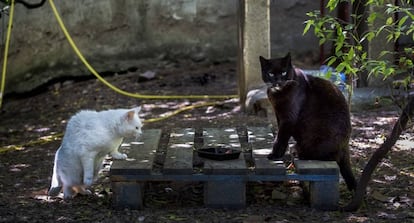What to do about Spain’s street cats?
Colonies are often found in Spanish towns and cities, causing bad smells and health risks, some residents complain

Street cats: for some people they’re vulnerable animals in need of protection, for others, they’re pests that need to be eradicated. In Barcelona, the authorities estimate there are around 700 colonies of feral cats: some 9,000 animals in total. In the Catalan capital and in other cities in Spain, local councils have subcontracted out the problem of keeping feline populations under control to animal protection societies, which sterilize them, treat them for parasites and feed them. The combined cost of cat management for Barcelona and its neighbors Girona and Tarragona last year was €157,000. In total, almost 3,000 cats were sterilized in the three cities.
Cat colonies are found in towns and cities throughout Spain. People living nearby say they are a health risk, often smell, and can be a nuisance when animals are in heat. Legislation passed in 2008 makes it illegal to poison cats, meaning that many local authorities are now opting to sterilize animals, a method that has been shown to be the most cost effective in keeping numbers down.
It normally costs between €40 and €200 to sterilize a cat, but many vets will offer the service for a lower price for animal protection societies. Francesc Alcázar, a vet in the small Catalan town of Ponts says that a female cat is capable of giving birth up to three times a year, and that sterilization is the only long-term solution.
AVEPA, which represents Spanish vets that specialize in household pets, says that if cats are to be sterilized, they should also be treated for parasites and vaccinated at the same time. Equally, it is critical of feeding animals living in colonies unless they are given medical treatment. Giving cats leftover food is also a potential health hazard and attracts other scavengers, such as boars, foxes, or seagulls, it says. Alcázar says sterilizing cats also helps prevent the spread of diseases such as toxoplasmosis, found in cat excrement, to humans.
It normally costs between €40 and €200 to sterilize a cat, but many vets will offer the service for a lower price for animal protection societies
In some towns in Catalonia, people continue to set poison for wild cats, but in other cities, local people – usually women – work to keep numbers down humanely. In the case of the popular tourist resort of Cadaqués, a local feline society raises money to have cats treated, which are then returned to their colonies, where numbers are kept down through lack of breeding.
The situation in smaller communities unwilling or unable to cover the cost of sterilizing cats illustrates how the problem can soon get out of hand. In Bellmunt d’Urgell, a village of some 200 people in Lleida province, there are some 100 feral cats. In Báscara, in Girona, a colony of cats has moved into the local nursery. “There comes a moment when it seems cats have more rights than people,” says the mayor, Narcís Saurina.
Feral cats are also a threat to small mammals and birds, which they often kill but don’t eat. Sergio Romero de Tejeada, the director of the Aiguamolls del Empordà, says there are some 70 wild cats living in the park in the Catalan Pyrenees. “It’s a difficult situation and is creating a serious imbalance. They eat everything, but the law prevents us from putting them down,” he says.
English version by Nick Lyne.
Sign up for our newsletter
EL PAÍS English Edition is launching a weekly newsletter. Sign up today to receive a selection of our best stories in your inbox every Saturday morning. For full details about how to subscribe, click here.
Tu suscripción se está usando en otro dispositivo
¿Quieres añadir otro usuario a tu suscripción?
Si continúas leyendo en este dispositivo, no se podrá leer en el otro.
FlechaTu suscripción se está usando en otro dispositivo y solo puedes acceder a EL PAÍS desde un dispositivo a la vez.
Si quieres compartir tu cuenta, cambia tu suscripción a la modalidad Premium, así podrás añadir otro usuario. Cada uno accederá con su propia cuenta de email, lo que os permitirá personalizar vuestra experiencia en EL PAÍS.
¿Tienes una suscripción de empresa? Accede aquí para contratar más cuentas.
En el caso de no saber quién está usando tu cuenta, te recomendamos cambiar tu contraseña aquí.
Si decides continuar compartiendo tu cuenta, este mensaje se mostrará en tu dispositivo y en el de la otra persona que está usando tu cuenta de forma indefinida, afectando a tu experiencia de lectura. Puedes consultar aquí los términos y condiciones de la suscripción digital.









































